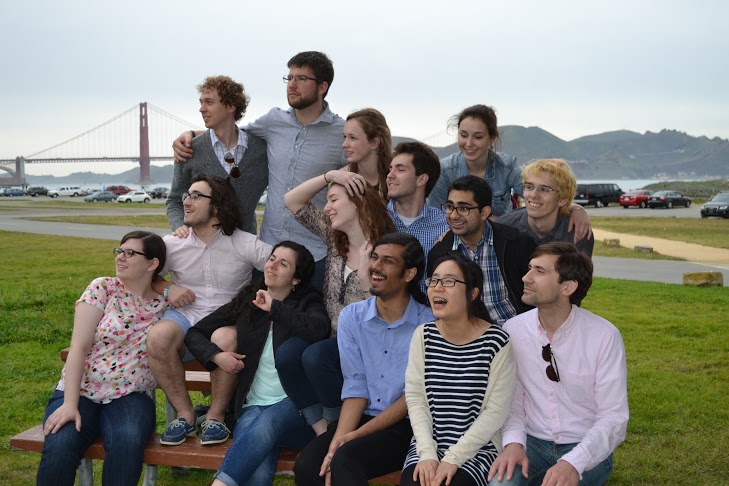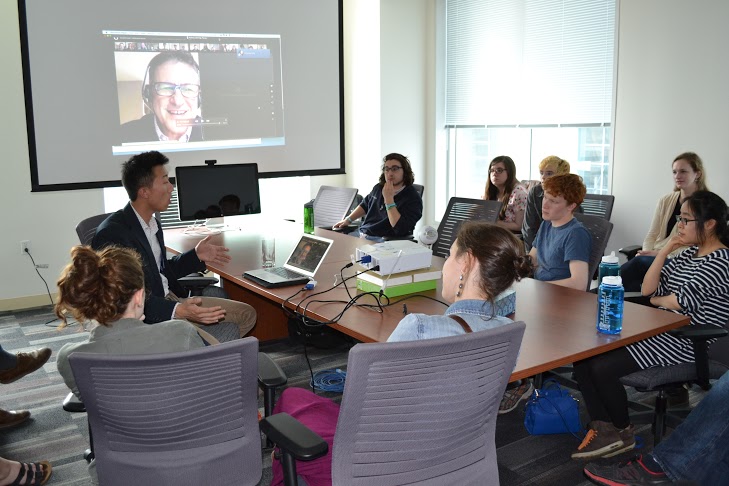On the ninth floor overlooking the busy San Francisco downtown, everyone is working on Macs in open-plan stations.
Books are stacked haphazardly in the common area, Post-it with ideas cover the whole wall, and conversation hums around the coffee bar — the atmosphere feels like any startup in California.
But I am in a school, with no students in sight — Minerva Schools at KGI, a new institution that envisions itself to shake the whole education arena.
With a group of students and professors, I embarked on a trip to San Francisco that themed around online education, where we visited Minerva and Khan Academy.
I have a long relationship with online education.
Since secondary school, I started to listen to iTunes U, which opened up a rich new world of humanities and social sciences that were not very available in China and Singapore. Later on I have taken some MOOCs (Massive Open Online Course) on Cousera and EdX. Now at Colgate – a liberal arts college, I am lucky enough to be part of the new initiative my advisor is experimenting — Selective Private Online Course (SPOC), a course that is open to the public but limiting to alumni to enhance interactions with students.
The class I am taking is called the Advent of Atomic Bomb, which examines the history, science and ethics behind atomic bomb. My experience had been, so far, bittersweet. While it is interesting and intellectually stimulating to engage with alumni from all age groups and various walks of life online, it is sometimes time-consuming to read the overwhelming posts and comments. Moreover, the workload is heavier. Besides the normal assigned readings and project-based homework offline, we need to watch the lectures online beforehand because class-time is for advanced discussion, so we are expected to know the basics on our own time. This targeted and technology-enhanced blend is challenging and rigorous, it is the way I want to be pushed. (Although sadly, my lazy mind sometimes prefers the more comfortable style traditional classes offer).
Time after time, I felt a twinge of regret for not going to Minerva because I didn’t want the normal path. I wanted expereince, risks, uncertainties, and possibilities. I blamed myself for not being brave and idealistic enough because I was concerned, at the time of acceptance, about the possibility of reapplying to colleges and worrying about the issue of financial aid, should Minerva fails (their credits can’t be transferred).
When the Harvard-graduate talks about how Minerva strips traditional education to its essence, apply pedagogical practices to seminar-based classes that engages students with learning, and remake education to inspire others follow their model, I not only re-examined my decision, but also my shifting views on education.
To me, Minerva is still exciting. However, while living in six countries and being the selected few still carry the allure, I question the real meaning behind it (students at Minerva will live in one city per semester after first year and the acceptance rate is only 2.8%).
Does being physically present in a country, spending most of the time taking online classes in dorms, while going shopping and sightseeking on weekends equate immersing in foreign cultures?
Aren’t existing study-abroad programs that allow students to take classes in local universities and live in host families more authentic? For affordability, at least my school subsidizes all expenses for students receiving financial aid. So is diversity. Does having a higher number of international students necessarily mean more different perspectives? And what about lab experience, student clubs and organizations? Definitely one can take advantage of resources in cities, but how can one truly make use of it in Berlin if one can’t speak German, in Barcelona if one can’t speak Spanish? (Minerva students stay in one city each semester after their first-year.)
As a for-profit company, Minerva feels like an elitist brand, with heavy marketing, big-talks, and focus on the science of efficiency and optimization. Like a smooth-running pedagogical machine, it experiments on students and tailor them to meet the job market’s needs. And what Minerva is doing, to my impression, is like developing a 2.0 version online learning platform.
So when Sal Khan sat on the organic-style stool in Khan Academy, talking about how he tries to make education accessible, I was moved. He began to tutor maths online, and then introduced a dazzling array of tutorials to improve the accessibility of content. Thanks to people like Sal Khan, information is becoming more free and ubiquitous, so classrooms are more for engaged and deeper-level discussion, for skills and real-life interaction. And I really appreciate how my own college can offer that, with all classes of size no more than 20, and many opportunities for clubs and activities available due to the small size of student body.
Granted, Minerva is still so young, and there will be many areas of improvement. I have faith that it is going to be better, with feedbacks from students and ongoing data analyzed using the best technology.
During lunch with a current student from Minerva, she showed me what their multimodal communication class was like. Students were divided into groups to debate during discussion, were picked to answer questions at random times during class, and somtimes were asked to poll for opinions. While the interactive interface looks cutting-edge, I just feel that something is lacking, and I won’t want a four-year classroom experience like this.
When my fellow tripmates and I discuss and share our views over a cup of coffee in the afternoon sun, I realize that what I really value after nearly a year of liberal arts education is the connection. This is not hindsight bias to justify my committed decision, but personally, I hate the panic when my computer break down and an online submission is due soon. Also, I don’t want to just “like” my classmates defense on his answer by clicking a button. I want to give him a pat or hit five with a wide grin. Most importantly, I treasure how my professors interact with me not just in class or office hours, but how they share with me their life stories over home-cooked dinner, after guests’ lectures, and during trips like this one.
I don’t think that brick-and-motar will be obsolete soon, but it can definitely become better. Technology is never a substitute, but a complement to make things better.
(Photo credits to Quanzhi’s professor and the director of the Benton Scholars Program Karen Harpp.)
(This blog was first posted in 2016),




